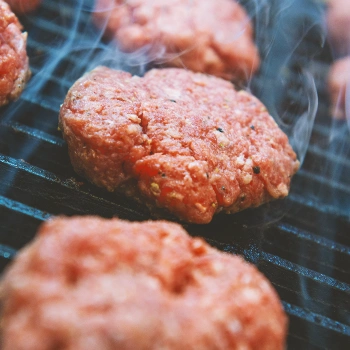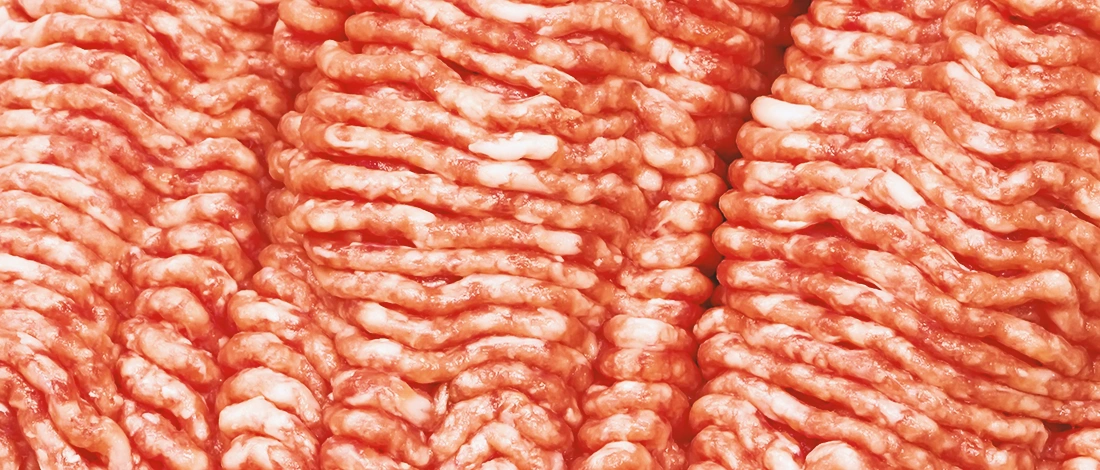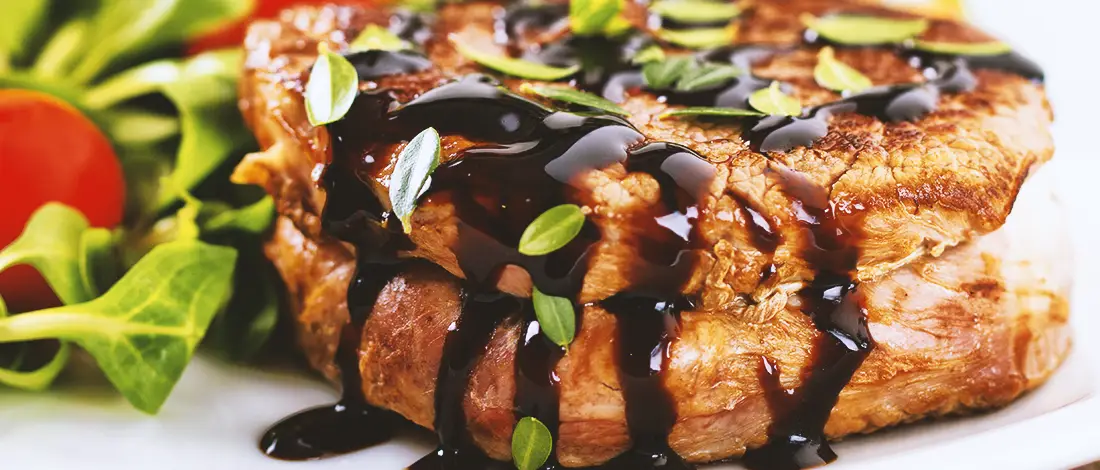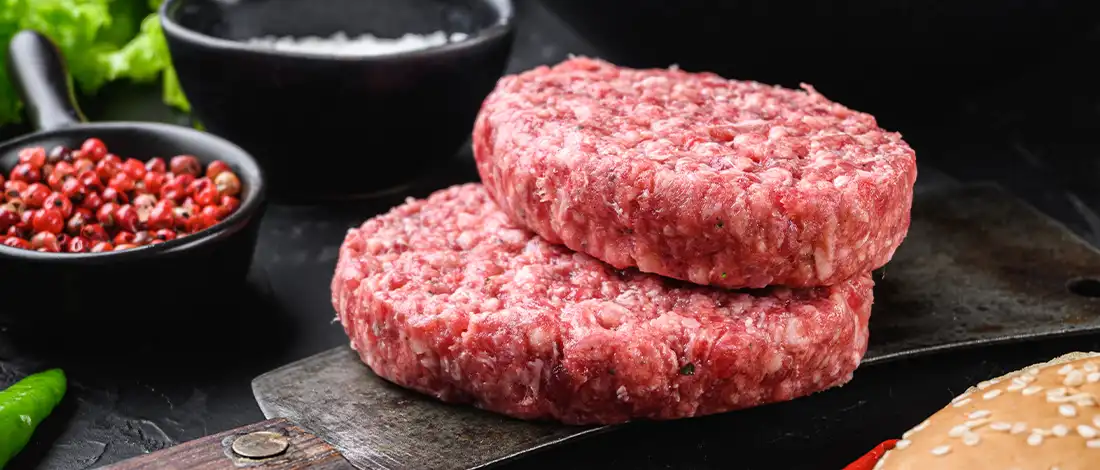I love burgers. My freezer is a gallery. Each patty is a masterpiece, waiting for its turn on the grill.
At Carnivore Style, we share the same love for this American classic, and we’re always looking for ways to make our meals both delicious and aligned with the carnivore lifestyle.
I love this American classic. But, I never thought of its nutrition—specifically, its protein content.
Eager to get nutrition facts and enlighten myself, I consulted a knowledgeable friend in the field of nutrition and sifted through a wealth of online data.
Join me as we delve into the lesser-known nutritional aspects of burgers in the next section.
Quick Summary
- Hamburger meat, usually ground beef, is rich in protein, with a 3oz serving providing 21g of protein.
- Hamburger meat is high in saturated fats, which can lead to health issues like cardiovascular diseases.
- Despite its high fat, hamburger meat has health benefits. It helps build cells, boosts the immune system, and increases hormone production.
How Much Protein Does Hamburger Meat Have?

Hamburger meat is usually ground beef, and ground beef is rich in protein. 3oz of cooked lean ground beef has 21g of protein [1].
You’ll get about 40g of protein if you have a double pattie burger. This is from meat alone.
Hamburgers also have buns. 1.5oz bun has about 4g of protein [2]. Veggies have good source of protein as well.
For example, one lettuce leaf, some raw onion, a tomato, and a spoon of mayo only have 1g of protein combined.
However, protein also comes from cheese. 1oz slice of Swiss cheese has about 7.6g of protein, cheddar has 7g, and American cheese has 5g of protein [3] [4] [5].
Here’s how much protein different kinds of beef ground beef have [6].
- 95% lean: 24.19g
- 90% lean: 22.60g
- 85% lean: 21g
- 80% lean: 19.40g
- 75% lean: 17.81g
- 70% lean: 16.22g
how Much Saturated Fat Is in Hamburger Meat?

Many calories in ground beef come from fat. 3oz of 85% lean ground beef has all calories and 12g of total fat, out of which 4.5g is saturated fat [8].
Unfortunately, this is the bad kind of fat. Saturated fat can lead to heart disease, increased cholesterol, and other cardiovascular diseases.
You should limit saturated fat intake to under 10% of total energy. Ideally, it should be 5% to 6% of daily calorie intake.
So, if you eat recommended 2,000 calories a day, you should eat less than 20g of saturated fat, ideally no more than 13g.
The good news is that not all fats in hamburger meat are unhealthy fats. 3oz serving size of 85% lean ground meat has 6g of monounsaturated fat and 0,4g of polyunsaturated fat.
“Hamburgers should be cooked to a safe minimum internal temperature to destroy harmful bacteria that may be present. Use a food thermometer to be sure they have reached a safe minimum internal temperature of 160 °F. If you’re cooking turkey burgers, they should be cooked to 165 °F.”
- USDA
There are several ways in which you can lower the amount of saturated fat in your diet from hamburger meat. If you prepare hamburger meat with vegetable oil, you can avoid having too much saturated fat.
Plus, you’ll have juicy, lean meat throughout. Generally, a good way to control how much saturated fat you intake is to go for leaner beef cuts. Also, cut down on mayo and cheese.
Does Hamburger Meat Have Health Benefits?

Hamburger meat has several benefits, such as:
- Builds cells — Ground beef is full of proteins, which help the body build bones and muscles and improves skin and blood quality.
- Boosts the immune system — Ground beef has vitamins like thiamin, riboflavin, niacin, folate, and cobalamin. These vitamins can’t be stored in the body, but you have to consume them through food, and they help boost the immune system.
- Boosts iron — Our bodies need heme and non-heme iron for red blood cells. Heme iron is found in animal proteins and helps boost iron which staves off anemia.
- Increases hormones — Ground beef is high in niacin and selenium. They boost hormone production and help thyroid function.
Related Articles:
FAQs
How Much Protein Is in a 4 Oz Hamburger?
There is 17,81g of protein in a 4 oz hamburger [9].
What Kind of Meat Gives the Most Protein?
Turkey breast gives the most protein.
At Carnivore Style, we believe that every burger can be both tasty and nutritious, fitting perfectly into a carnivore diet. Whether you're enjoying them on their own or as part of a bigger meal, knowing the nutritional benefits can help you make the most out of your burger experience.
References:
- https://www.eatthismuch.com/food/nutrition/ground-beef,5418/
- https://www.eatthismuch.com/food/nutrition/hamburger-buns,493506/
- https://www.nutritionix.com/i/usda/cheese-swiss-1-slice-1-oz/513fceb375b8dbbc21000088
- https://www.urmc.rochester.edu/encyclopedia/content.aspx?contenttypeid=76&contentid
- https://www.nutritionix.com/i/usda/american-cheese-1-slice-1-oz/513fceb375b8dbbc21
- https://www.fatsecret.com/calories-nutrition/food/ground-beef/protein
- https://www.dietaryguidelines.gov/sites/default/files/2020-12/Dietary_Guidelines_for_
- https://www.eatthismuch.com/food/nutrition/ground-beef,5418/
- https://www.urmc.rochester.edu/encyclopedia/content.aspx?contenttypeid









Guess burgers are the new protein shakes. I’ll take mine medium-rare with a side of gains, please. It’s nice to know I can keep things simple and delicious while still getting all the protein I need for my workouts.
Appreciate the breakdown of different fat ratios. It’s tough to find this kind of detailed info when you’re just starting out on a high-protein diet.
Looks like I’ve got an excuse to fire up the grill more often. It’s awesome to know that one of my favorite foods packs such a punch in terms of protein.
Wow, 21g of protein in just 3oz of hamburger meat. Looks like I’ve been underestimating my burger gains this whole time.
Great article. I was shocked to find out that 100g of ground beef contains 26g of protein. Definitely going to be adjusting my portions and making sure I’m getting enough protein in my post-workout meal.